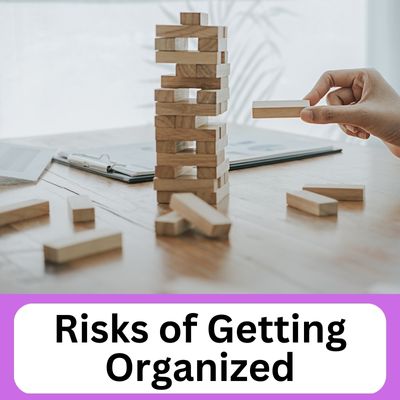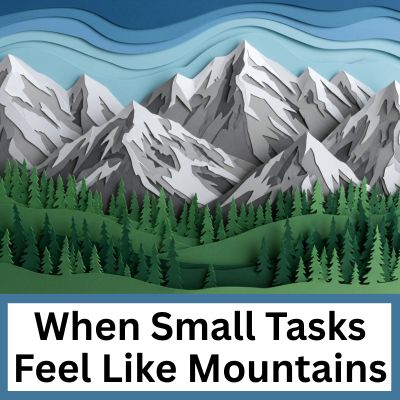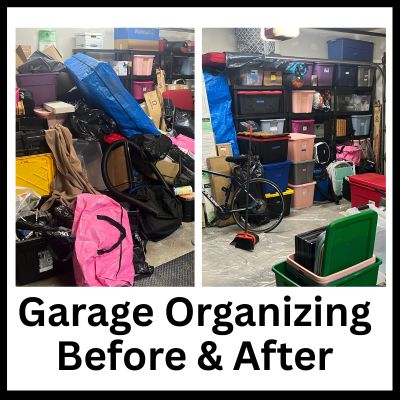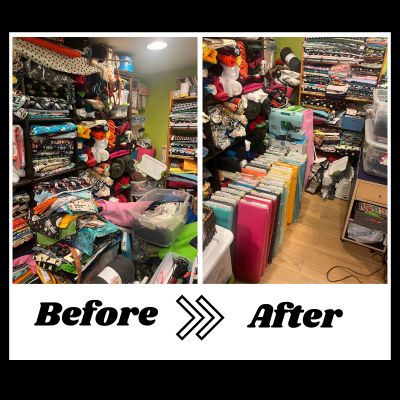Risks of Getting Organized

For the hundreds of great health benefits having a nicely organized home can have, there are plenty of risks associated with getting organized. Disorganization can sometimes be a coping mechanism for other things that haven’t been resolved. Getting organized might bring these other issues to the surface. In this post, I’ll talk about some of the risks that getting organized may pose.
- Some people thrive in cluttered and chaotic environments
While some people see a serene interior space, free from distractions and excess, and immediately feel like they can relax and/or feel inspired to be productive, other people do really well in cluttered in chaotic environments. They may enjoy the visual noise, and actually may get inspired by the clutter. Metaphorically, think about looking up words in a dictionary. Some people just love doing this because through the act of thumbing through the pages, they discover other words they hadn’t thought of or didn’t know. People who like to tinker with things may love to have extra scraps of wood, metal, cardboard, and other materials around, not only because they get ideas from these things, but because they need these materials at the ready. If you’re someone who loves being in a cluttered environment, don’t sweat the societal pressures of conforming to what magazines show us as the norm.
- Clutter can serve as boundaries
If someone has had their boundaries invaded, and doesn’t have the language or self-confidence to be able to stick up for themselves and uphold their energetic, emotional, or physical boundaries, they may subconsciously turn to “stuff” to build walls around them. Taking away this stuff can be really challenging and can bring up major feelings of vulnerability. It’s important to learn how to set boundaries effectively through language, body language, energetics, and thoughts before any significant dismantling of stuff can occur.
- Fewer excuses to not socialize
When a guest room isn’t full of stuff, you won’t have the excuse to not have overnight visitor’s anymore. Or when your house isn’t cluttered, you won’t have the excuse to not let people come over. Conversely, when you don’t have the excuse that you can’t go out because you “have to clean”. My recommendation here is to be incredibly discerning about who you let into your life. Only surround yourself with people whom you feel loved, cherished, and adored. If you’ve got someone in your life who constantly makes you feel bad, or is always trying to guilt-trip you, stop spending any time with them, no matter who they are. It’s not your duty to put any energy towards anyone who is unkind to you.
- Organization can reveal feelings of isolation
Similarly to how clutter can serve as boundaries, and can give people excuses not to socialize, it can also keep people company. Some people have spent so many years isolating themselves with the clutter. Removing the clutter can emphasize feelings of loneliness. It can be hard to make friends and maintain relationships. As you’re gradually removing the clutter, make a point to join a club or take a class so that you can meet people who have similar interests. You may also need to work with a coach energy-worker, or therapist who can help identify healthy and unhealthy relationships, especially if you’re someone who has a history of having challenging friendships.
- Change is scary!
If you’re someone who has lived for a long time with a lot of clutter, your identity is wrapped up with being a cluttered person. Your brain wants to keep things the same because you’ve been able to survive. It doesn’t like change. This has been your comfort zone for so long! If you try to change things too fast, or things get “too good”, your brain may subconsciously try to sabotage you. You can do self-help work to help you identify limiting beliefs about being organized, or you can work with a coach, energy-worker, or therapist so that you can transcend your beliefs.
- Dealing with challenging emotions
It’s very rare to declutter without coming across an item that brings up challenging emotions. Paper, letters, books, clothing, kitchenware, sentimental items… difficult emotions can be lurking anywhere. Lots of people avoid decluttering because they don’t want to feel those uncomfortable feelings again. Often, these challenging objects get buried under more clutter to postpone having to deal with them. If you’ve been putting off decluttering because you don’t want to feel uncomfortable, find someone who can help you. Professional organizers understand how emotions can get lodged in objects. We know how someone might cry uncontrollably to let go of something, but they aren’t upset about letting go of the object, they are upset over the memory the object held. Unresolved grief and trauma can temporarily be stored in objects. If you’re someone who is very private and doesn’t want to process your stuff with another human, it can be very helpful to have an emotional support animal or even a stuffed animal to help you process the stuff. You can even call in (or pretend to call in) loved ones who have crossed over to assist you. Another solution I love is to record yourself decluttering- make a selfie video of your process on your phone. Even if you immediately delete it and never watch it, the act of recording yourself will change your perspective and bring a sense of humor and lightness to the situation. It really does take the edge off!
- Facing addictions
Addictions are usually not the healthiest coping mechanism, but they are the best coping mechanism someone has at the time. Over-collecting, compulsive shopping, busy-ness, co-dependence, and substance abuse, are all examples of addictions (or forms of addiction) that can make someone’s house very disorganized! The disorganization usually cannot be cured until these addictions are addressed. Many people have found great assistance through attending 12-step groups, but I know they don’t work for everyone. Recovering from these addictions usually requires mental health counseling.
- Anxiety “Did I give that away?”
It’s very common to worry about giving away something that you’ll need in the future, or to wonder if you still have something or not. Just remember, this is part of the process. Trust that you will always have what you need. This can be very hard for people who grew up not feeling cared for. They couldn’t trust that their caretakers would always be there to provide for them and have their best interest in mind. It can take some serious brain re-programming to shift these beliefs. Feelings of “I don’t have enough” often stem from feelings of “I am not enough”. I have two coaches/therapists that I love to refer to that really understand this concept. If you are someone who struggles with worrying if you’ll have what you need, contact me for two great referrals.
- Fear of failure & fear of success
What if you get started on your organizing pursuit and you totally fail? What if you make mistakes and give away too much? What if you get everything clean only to mess it all up a week later? Or what if you actually do get it organized? Will it take a lot of work to maintain? Can you uphold expectations? Who will you be with this new identity? Will your life totally change? Again, I have great coaches/therapists that I love to refer to that really understand this concept. If you are someone who struggles with fears of failure and success, contact me for a referral.
- Cost
Many people avoid getting organized because they may not be able to afford hiring a professional organizer or a hauling company to help them let go of their stuff. There are lots of free online resources or support groups to help you go through your stuff efficiently, and Buy Nothing may be a good solution to get rid of things that could still be of value to someone else. The thought of all the money that was spent on everything that has accumulated in the house may prevent someone from allowing it to leave their house. Companies like Max Sold may be able to help you liquidate some of your belongings, but it’s important to remember that it’s very unlikely that you’ll be able to recover your costs for all the purchases you’ve made.
What other risks are associated with getting organized?

By Jean Prominski, Certified Professional Organizer
Check out my media exposure: Seattle Sparkle in the Media
Download my free 5 week journal The Seattle Sparkle Method to Get Organized and Stay Organized
Sign up for my free 4 Day Color to Declutter Challenge.
Become part of a like-minded community by joining my Facebook Group, Declutter and Organize with Seattle Sparkle.
Ready to book a consultation? Complete this form.
For artwork to energize your home, order through jeanprominski.com.




